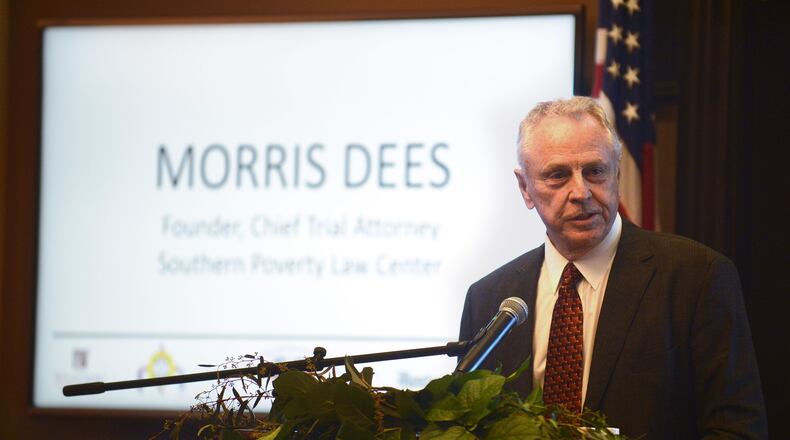MONTGOMERY, Ala. — The Southern Poverty Law Center has fired Morris Dees, the civil rights organization's co-founder and former chief litigator.
Dees, 82, co-founded the Montgomery-based organization in 1971.
SPLC President Richard Cohen said in a statement Dees' dismissal was effective on Wednesday, March 13.
"Effective yesterday, Morris Dees' employment at the Southern Poverty Law Center (SPLC) was terminated. As a civil rights organization, the SPLC is committed to ensuring that the conduct of our staff reflects the mission of the organization and the values we hope to instill in the world. When one of our own fails to meet those standards, no matter his or her role in the organization, we take it seriously and must take appropriate action.
"Today we announced a number of immediate, concrete next steps we're taking, including bringing in an outside organization to conduct a comprehensive assessment of our internal climate and workplace practices, to ensure that our talented staff is working in the environment that they deserve – one in which all voices are heard and all staff members are respected.
"The SPLC is deeply committed to having a workplace that reflects the values it espouses – truth, justice, equity and inclusion, and we believe the steps we have taken today reaffirm that commitment."
An SPLC spokesperson said the organization was "in the process of hiring" the firm for the workplace climate assessment, and no other leadership changes had been announced.
A message seeking further comment was left on Cohen's cell phone Thursday afternoon.
Dees' biography appeared scrubbed from the SPLC's website as news broke of his termination on Thursday afternoon.
A Montgomery native, Dees burnished his marketing chops by managing a direct sale book publishing company while attending the University of Alabama, where he also earned a law degree.
After returning home to establish a law practice in 1960, Dees won a series of civil rights cases before establishing the SPLC with lawyer Joseph J. Levin Jr. and civil rights activist Julian Bond a decade later.
The legal partnership netted significant civil rights triumphs. Dees challenged systemic discrimination and segregation in Alabama state trooper ranks in a case won in the U.S. Supreme Court. SPLC litigation challenging Alabama's legislative districts forced the state to redraw its districts in the early 1970s, leading to the election of more than a dozen black legislators in 1974.
Early SPLC lawsuits also fought for better conditions for cotton mill workers in Kentucky, women in the workplace and poor defendants on death row. The organization bankrupted a Ku Klux Klan Organization, the United Klans of America, in a 1987 civil case.
Dees has been a fixture in politics since the group's ascension, though his organization has faced scrutiny in the past.
A 1994 Montgomery Advertiser series provided a deep look into the organization controlled by the multimillionaire Dees, illustrating his near-singular control over the organization and its mammoth budget.
It revealed a figure seen as heroic by some and single-minded by others who criticized Dees as more focused on raising money than actually fighting injustice.
'We're doing our job': Southern Poverty Law Center sued by Proud Boys founder Gavin McInnes
Southern Poverty Law Center: Hate group count hits 20-year high amid rise in white supremacy, report says
The series also alleged discriminatory treatment of black employees within the advocacy group, despite its outward efforts to improve the treatment of minorities in the country. Staffers at the time "accused Morris Dees, the center's driving force, of being a racist and black employees have 'felt threatened and banded together.'" The organization denied the accusations raised in the series.
Dees' central role in the organization has also led to numerous threats against him, and the Advertiser previously reported that he has 24-hour protection at his home.
Over the years, the Center has continued to amass a massive war chest of funds from donors amid differing levels of scrutiny. That money has been used for litigation, advocacy, research and a host of other ventures on a variety of topics, including prisons, payday lending, discrimination and hate groups.
In recent years, the organization has become nationally known and scrutinized for its Hatewatch work tracking the rise of hate groups, particularly white supremacists.
It continues to produce research and advocacy on a variety of topics, including payday lending, civil asset forfeiture and immigration rights. The SPLC also continues its day-to-day civil rights litigation, including an ongoing lawsuit to address prison conditions in Alabama.
"The SPLC is deeply committed to having a workplace that reflects the values it espouses — truth, justice, equity and inclusion, and we believe the steps we have taken today reaffirm that commitment," Cohen said.
Contributing: Brian Lyman, Montgomery (Ala.) Advertiser
About the Author
Keep Reading
The Latest
Featured



